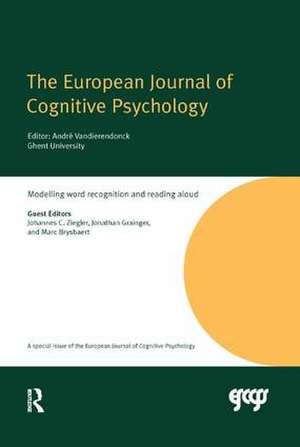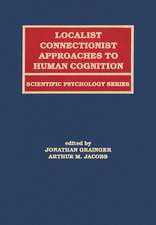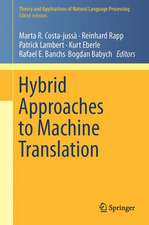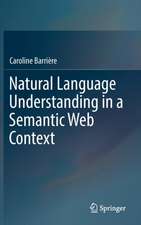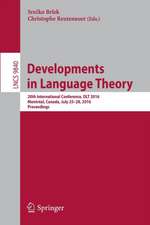Modelling Word Recognition and Reading Aloud: A Special Issue of the European Journal of Cognitive Psychology: Special Issues of the Journal of Cognitive Psychology
Editat de Johannes C. Ziegler, Jonathan Grainger, Marc Brysbaerten Limba Engleză Paperback – 6 iun 2019
| Toate formatele și edițiile | Preț | Express |
|---|---|---|
| Paperback (1) | 191.21 lei 6-8 săpt. | |
| Taylor & Francis – 6 iun 2019 | 191.21 lei 6-8 săpt. | |
| Hardback (1) | 498.17 lei 6-8 săpt. | |
| Taylor & Francis – 26 aug 2010 | 498.17 lei 6-8 săpt. |
Preț: 191.21 lei
Preț vechi: 230.98 lei
-17% Nou
Puncte Express: 287
Preț estimativ în valută:
36.59€ • 38.20$ • 30.28£
36.59€ • 38.20$ • 30.28£
Carte tipărită la comandă
Livrare economică 04-18 aprilie
Preluare comenzi: 021 569.72.76
Specificații
ISBN-13: 9781138381186
ISBN-10: 1138381187
Pagini: 256
Dimensiuni: 156 x 234 mm
Greutate: 0.47 kg
Ediția:1
Editura: Taylor & Francis
Colecția Psychology Press
Seria Special Issues of the Journal of Cognitive Psychology
Locul publicării:Oxford, United Kingdom
ISBN-10: 1138381187
Pagini: 256
Dimensiuni: 156 x 234 mm
Greutate: 0.47 kg
Ediția:1
Editura: Taylor & Francis
Colecția Psychology Press
Seria Special Issues of the Journal of Cognitive Psychology
Locul publicării:Oxford, United Kingdom
Cuprins
D.E. Sibley, C.T. Kello, M.S. Seidenberg, Learning Orthographic and Phonological Representations in Models of Monosyllabic and Bisyllabic Naming. S. Dufau, B. Lété, C. Touzet, H. Glotin, J.C. Ziegler, J. Grainger, A Developmental Perspective on Visual Word Recognition: New Evidence and a Self-Organizing Model. C.J. Davis, SOLAR Versus SERIOL Revisited. P. Mousikou, M. Coltheart, S. Saunders, Computational Modeling of the Masked Onset Priming Effect in Reading Aloud. K. Diependaele, J.C. Ziegler, J. Grainger, Fast Phonology and the Bi-modal Interactive Activation Model. J.S. Bowers, Does Masked and Unmasked Priming Reflect Bayesian Inference as Implemented in the Bayesian Reader? C. Perry, J.C. Ziegler, M. Braun, M. Zorzi, Rules Versus Statistics in Reading Aloud: New Evidence on an Old Debate. G. Pagliuca, P. Monaghan, Discovering Large Grain-sizes in a Transparent Orthography: Insights from a Connectionist Model of Italian Word Naming. M. Zorzi, The Connectionist Dual Process (CDP) Approach to Modeling Reading Aloud. M. Conrad, S. Tamm, M. Carreiras, A.M. Jacobs, Simulating Syllable Frequency Effects Within an Interactive Activation Framework.
Descriere
Computational modeling of word recognition is one of the most active and promising areas of Cognitive Psychology. Indeed, over the past 30 years, computational modelling has tremendously advanced our understanding of the core processes involved in normal and impaired reading. The present special issue offers a unique collection of cutting edge research on modeling word recognition and reading aloud. Key issues include self-organized learning of orthographic representations, models of multi-syllabic reading, modelling masked priming and the front-end of reading, rule-based versus statistical learning, and interactive-activation accounts of rapid phonological activation and multi-syllabic processing.
